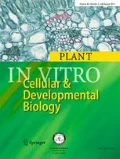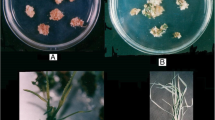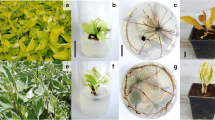Summary
Genomic DNA isolated from embryogenic cultures of two mango cultivars, ‘Hindi’ and ‘Carabao,’ that had been selected for resistance to the culture filtrate ofColletotrichum gloeosporioides, was analyzed using Randomly Amplified Polymorphic DNA (RAPD).In vitro selection caused changes in RAPD markers in the selected embryogenic cultures with respect to the unchallenged control cultures and the stock plants. The differences involved both the absence and the presence of additional RAPD markers in the resistant lines, although the former was most commonly observed. The absence of differences between the unchallenged control of either cultivar and DNA from the leaves of parent trees confirmed that the changes were not due to prolonged maintenance in liquid cultures.
Similar content being viewed by others
References
Ballio, A.; Bottalico, A.; Buonocore, V., et al. Production and isolation of aspergillomarasmin B (lycomarasmic acid) from cultures ofColletotrichum gloeosporioides Penz. (Gloesporum olivarum Alm.). Phytopathol. Mediterr. 8:187–196; 1969.
Bosquet, J. F.; Vegh, I.; Pouteau-Thouvenot, M., et al. Isolemant de l'aspergillomarasmine A de cultures deColletotrichum gloeosporioides Penz. agent pathogene des saules. Ann. Phytopathol. 3:407–408; 1971.
Collins, G. G.; Symons, R. H. Polymorphisms in grapevine DNA detected by the RAPD-PCR technique. Plant Mol. Biol. Rep. 11:105–112; 1993.
Dan, Y. H.; Stephens, C. T. DNA polymorphisms in somaclonal variants ofAsparagus officinalis L. resistant toFusarium oxysporum f.sp.asparagi. Plant Tiss. Cult. Biotech. 2:89–96; 1997.
Deng, Z. N.; Gentile, A.; Domina, F., et al. Recovery of citrus somatic hybrids tolerant toPhoma tracheiphila toxin, combining selection and identification by RAPD markers. In: Terzi, M.; Cella, R.; Falavigna, A., eds. Current issues in plant molecular and cellular biology. Dordrecht, Netherlands: Kluwer Academic Publishers; 1995:177–183.
Doyle, J. J.; Doyle, J. L. Isolation of plant DNA from fresh tissue. Focus 12:13–15; 1990.
Gohbara, M.; Kosuge, Y.; Yamasaki, S., et al. Isolation, structures and biological activities of colletotrichins, phytotoxic substances fromColletotrichum nicotianae. Agric. Biol. Chem. 42:1037–1043; 1978.
Harding, K. The methylation status of DNA derived from potato plants recovered from slow growth. Plant Cell Tissue Organ Cult. 37:31–38; 1994.
Harding, K.; Benson, E. E.; Roubelakis-Angelakis, A. Methylated DNA changes associated with the initiation and maintenance ofVitis vinifera in vitro shoot and callus cultures: a possible mechanism for age related changes. Vitis 35:79–85; 1996.
Hashmi, G.; Huettel, R.; Meyer, R., et al. RAPD analysis of somaclonal variants derived from embryo callus cultures of peach. Plant Cell Rep. 16:624–627; 1997.
Jayasankar, S.; Litz, R. E. Characterization of mango embryogenic cultures selected for resistance to the culture filtrate ofColletotrichum gloeosporioides. Theor. Appl. Genet.; in press: 1998.
Kaeppler, S. M.; Phillips, R. N. DNA methylation and tissue culture induced variation in plants. In Vitro Cell. Dev. Biol. 29P:125–130; 1993.
Knogge, W. Fungal infection of plants. Plant Cell 8:1711–1722; 1996.
Lambe, P.; Mutambal, H. S.; Fouche, J. G., et al. DNA methylation as a key process in regulation of organogenic totipotency and plant neoplastic progression? In Vitro Cell. Dev. Biol. 33P:155–162; 1997.
Larkin, P. J.; Scowcroft, W. R. Somaclonal variation—a novel source of variability from cell cultures for plant improvement. Theor. Appl. Genet. 60:197–214; 1981.
Litz, R. E.; Moon, P. A.; Jayasankar, S., et al. Somatic embryos of mango (Mangifera indica L.). In: Jain, S.; Gupta, P.; Newton, R., eds. Somatic embryogenesis in woody plants. Vol. II. Angiosperms. Dordrecht, Netherlands: Kluwer Academic Publishers; 1995:341–356.
Martin, G. B.; Williams, J. G. K.; Tanksley, S. D. Rapid identification of markers linked toPseudomonas resistance gene in tomato by using random primers and near-isogenic lines. Proc. Natl. Acad. Sci. USA 88:2336–2340; 1991.
Michelmore, R. W.; Paran, I.; Kesseli, R. V. Identification of markers linked to disease-resistance genes by bulked segregant analysis: a rapid method to detect markers in specific genome regions by using segregating populations. Proc. Natl. Acad. Sci. USA 88:9828–9832; 1991.
Moore, G. A.; Durham, R. E. Molecular markers. In: Hammerschlag, F. A.; Litz, R. E., eds. Biotechnology of perennial fruit crops. Wallingford, UK, CAB International; 1992:105–140.
Oropeza, M.; Guevara, P.; Garcia, E., et al. Identification of somaclonal variants of sugarcane (Saccharum spp.) resistant to sugarcane mosaic virus via RAPD markers. Plant Mol. Biol. Rep. 13:182–191; 1995.
Rafelsky, J. A.; Tingey, S. V. Genetic diagnostics in plant breeding: RAPDs, microsatellites and machines. Trends Genet. 9:275–280; 1993.
Rival, A.; Berlenc, F. A.; Morcillo, F., et al. Scaling upin vitro clonal propagation through somatic embryogenesis: the case of oil palm (Elaeis guineensis Jacq.). Plant Tiss. Cult. Biotech. 2:74–83; 1997.
Roby, D.; Broglie, K.; Cressman, R., et al. Activation of a bean chitinase promotor in transgenic tobacco plants by phytopathogenic fungi. Plant Cell 2:999–1007; 1990.
Ronning, C. M.; Schnell, R. J.; Gazit, S. Using randomly amplified polymorphic DNA (RAPD) to identifyAnona cultivars. J. Am. Soc. Hortic. Sci. 120:726–729; 1995a.
Ronning, C. M.; Schnell, R. J.; Kuhn, D. et al. Inheritance of randomly amplified polymorphic DNA (RAPD) markers inTheobroma cacao L. J. Am. Soc. Hortic. Sci. 120:681–686; 1995b.
Schneider, S.; Reustle, G.; Zyprian, E. Detection of somaclonal variation in grapevine regenerants from protoplasts by RAPD-PCR. Vitis 35:99–100; 1996.
Schnell, R. J.; Knight, R. J., Jr. Genetic relationships amongMangifera species based on RAPD markers. Acta Hortic. 341:86–92; 1993.
Schnell, R. J.; Ronning, C. M.; Knight, R. J., Jr. Identification of cultivars and validation of genetic relationships inMangifera indica L. using RAPD markers. Theor. Appl. Genet. 90:269–274; 1995.
Scowcroft, W. R.; Larkin, P. J.; Brettell, R. I. S. Genetic variation from tissue culture. In: Helgeson, J. P.; Deverall, B. J., eds. Use of tissue culture and protoplasts in plant pathology. New York: Academic Press; 1983:139–163.
Stiles, J. I.; Lemme, C.; Sondur, S., et al. Using randomly amplified polymorphic DNA for evaluating genetic relationships among papaya cultivars. Theor. Appl. Genet. 85:697–701; 1993.
Tulseiram, L. K.; Glaubitz, J. C.; Kiss, G., et al. Single tree genetic linkage mapping in conifers using haploid DNA from megagametophytes. Bio/Technology 10:686–690; 1992.
Welsh, J.; McClelland, M. Fingerprinting genomes using PCR with arbitrary primers. Nucleic Acids Res. 18:7213–7218; 1990.
Williams, J. G. K.; Kubelik, A. R.; Livak, K. J. DNA polymorphisms amplified by arbitrary primers are useful as genetic markers. Nucleic Acids Res. 18:6531–6535; 1990.
Author information
Authors and Affiliations
Rights and permissions
About this article
Cite this article
Jayasankar, S., Litz, R.E., Schnell, R.J. et al. Embryogenic mango cultures selected for resistance toColletotrichum gloeosporioides culture filtrate show variation in random amplified polymorphic DNA (RAPD) markers. In Vitro Cell.Dev.Biol.-Plant 34, 112–116 (1998). https://doi.org/10.1007/BF02822774
Received:
Accepted:
Issue Date:
DOI: https://doi.org/10.1007/BF02822774




